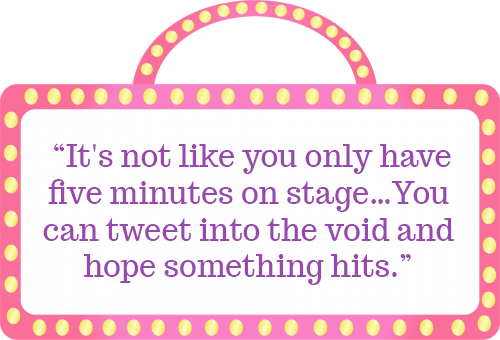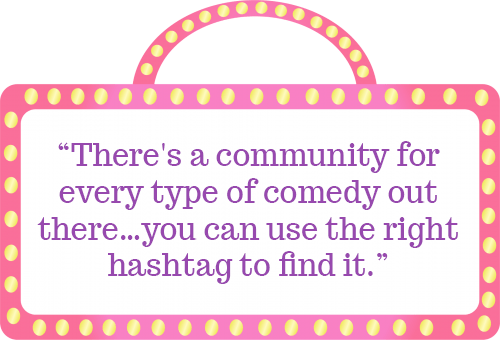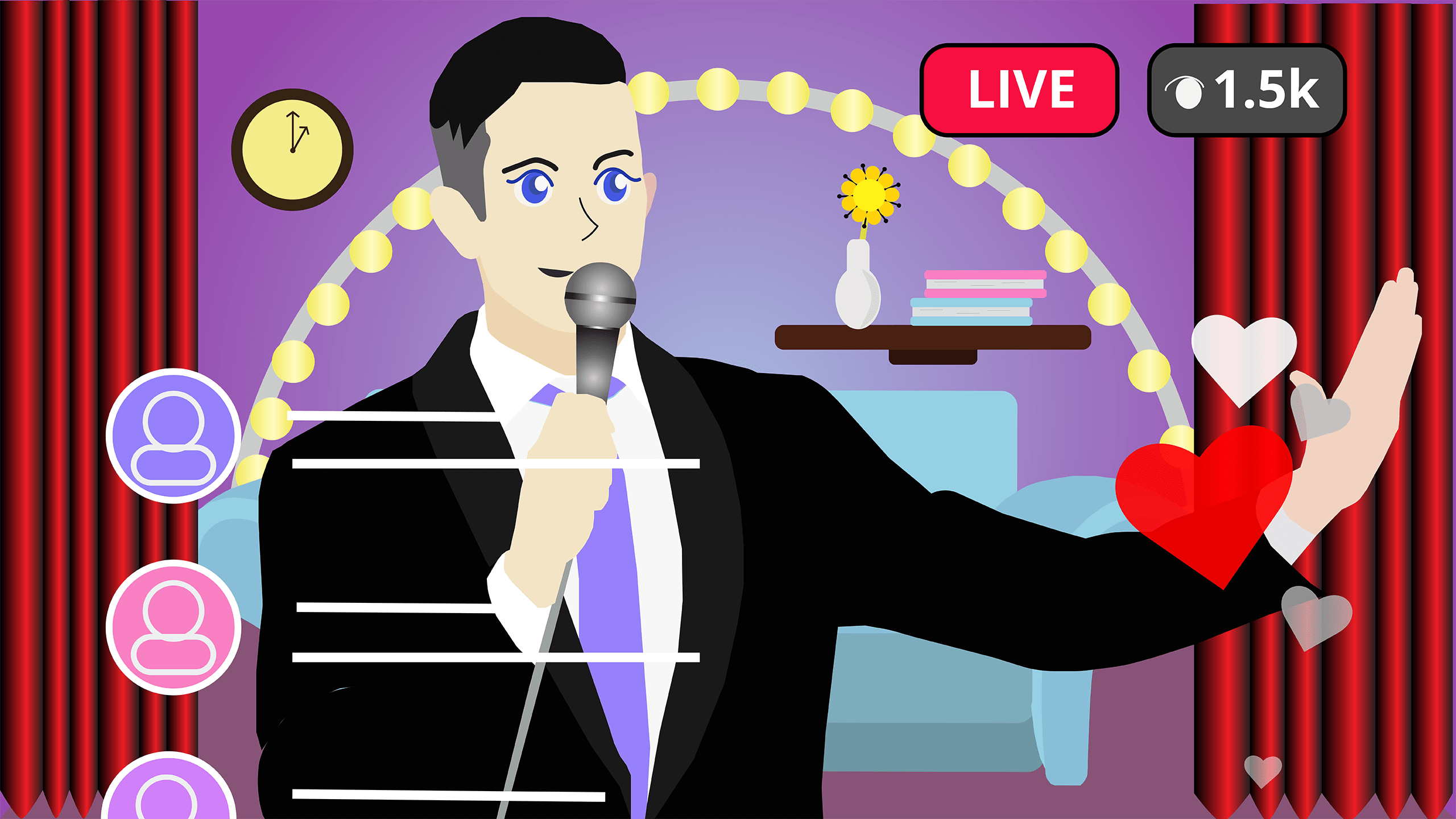The internet has made it easier than ever to enter the comedy world, but Gen Z are also better positioned to find success
By Serena Lopez
Illustrations by Jimmy Kwan
In her second year at Ryerson, a week before her audition to be part of an on-campus sketch comedy troupe called RiOT, Amelia Ritthaler panicked as she sat in her dorm room Googling how to write a sketch. The audition process required her to write and perform both a sketch and a stand-up, but Ritthaler had no experience writing comedy. But after finding the right template for a comedy sketch online, in just a few hours she wrote and submitted “Vegan Church,” a sketch about vegans who must confess their diet sins to a priest in the ‘Holy Vegan Church,’ with the sins getting more absurd with each confession. Ritthaler ended up having a successful audition and landed her first gig in comedy writing and performing sketches.
From there, Ritthaler went on to perform stand-up and produce improv comedy shows at comedy clubs around the city. She had difficulty finding her way into the city’s comedy scene, partly because she had just moved from a town outside Austin, Texas. Ritthaler felt the only way she would connect with a Canadian audience was through comedy that was non-political or focused on Canadian stereotypes. “Toronto really has a low ceiling in terms of how you can be successful in comedy,” she says.
On top of feeling disconnected from her audience, Ritthaler couldn’t relate to the performers that led the traditional comedy scene either. Before auditioning for RiOT, Ritthaler had started taking improv classes at Second City—an improv and sketch comedy theatre company known for its comedy classes and successful alumni. After taking two classes, she realized that she was performing alongside mostly older people. Since a majority of performers and audiences in Toronto’s comedy scene are “older millennials,” she says older people wouldn’t necessarily share the same references or appreciation for the much darker and unhinged humour that is generally adopted by Gen Z comedians.

Since graduating from Ryerson’s media production program this past June, the 22-year-old has moved to Los Angeles to pursue opportunities in comedy more seriously. She started taking classes at the Upright Citizens Brigade Improvisation and Sketch Comedy Training Center (UCB). UCB is an accredited improv and sketch comedy school in Los Angeles that, like other schools, was forced to move online because of the pandemic. And with COVID-19 keeping everyone indoors, Ritthaler has looked to social media as a way of exercising her comedic voice.
Already averaging about 10 hours a day on social media alone, Ritthaler noticed old tweets of hers were getting good engagement. She began thinking of ways to expand on her comedy through Twitter. Ritthaler is inspired by the likes of comedian Rachel Sennott, whose online comedy influences her own in-person stand-up work where she does satirical commentary on her experiences with relationships and sexuality. While writing stand-up, Ritthaler also draws from her own self-deprecating tweets that articulate the day-to-day experiences of navigating life after graduation as a young person in a new place who was unemployed for most of the year. Most recently, her tweet about avoiding confrontation with her inner child with a photo referencing Uptown Girls went viral with more than 92,000 likes.
When considering the benefits of engaging an audience online rather than in an in-person stand-up performance, Ritthaler says social media is more accessible than paying for a live show and hoping to like a performer’s comedy. She says it’s also a more attractive way for comedians to build a platform than if they were to only perform at open mics.
“I like Twitter because it’s low stakes. It’s not like you only have five minutes on stage, and you’re forced to figure it out [on the spot]. You can tweet into the void and hope something hits.”
In just under 180 characters Ritthaler can sum up the thoughts you most likely had about your middle school crush (and their abs) in a quick and clever way that will make you laugh at its cringey accuracy. She usually tweets daily to see what jokes will work, without putting pressure on herself to be funny (though she admits she’ll delete a tweet after five to 10 minutes if she doesn’t see it getting a good response or wide engagement).
Social media platforms have recently become a popular way for young comedians to express themselves through comedy. Young people like Ryerson graduate Boman Martinez-Reid, Raina Morris and Elsa Majimbo have all garnered strong followings over social media platforms by posting front-facing videos and tweets that are a mix of self-deprecating humour, memes and dark comedic takes on the state of the world.
me making a deal with my inner child to put off healing for another day pic.twitter.com/nDHndh4LVm
— Amelia Ritthaler (@ameliaritt) September 22, 2020
Online comedy is becoming a new way for young comedians to carve out their own space and be inventive on their own terms. The internet is not only an easier way to make an entrance into the comedy world; it’s also a platform that, compared to older generations of performers, young people are better equipped to find success on.
Andrew Clark, a journalist, author and director of the comedy writing and performance program at Humber College, says that although live performance is integral to being a comedian, the appeal of social media to younger comics is that there’s a lot of space for freedom and creativity.
“Younger artists tend to be more open-minded when it comes to new technologies and they understand them and embrace them,” says Clark.
He says the comedy world has always relied on younger comedians to come up with new creative ways of being funny.
“I think it’s a good time to be a young comic because you’re versatile and you can adapt,” says Clark. “Those who are more entrenched in how they do things will have more difficulty doing that.”
For example, Toronto-based comedian, actress and writer Julie Nolke’s comedy sketch video called “Explaining the pandemic to myself” went viral back in April of this year with more than 17 million views on Youtube. Nolke’s Youtube channel is where she publishes other comedy sketch videos poking fun at pandemic dating and travel influencers.
With an ongoing pandemic, opportunities to build a platform as a start-up comedian in the city are becoming limited in Toronto’s narrowing comedy scene with venues like The Ossington as well as Friday Roots and Vibes closing down. COVID-19 is also forcing many comedy clubs to host shows and classes online, or stay open to audiences at smaller capacities.
However, Anne McMaster, a professional comedian and improv comedy instructor at Second City, says a pandemic is a “great time to be putting stuff out online.”
McMaster says she thinks doing comedy online is going to be a new way for comedians to connect to a larger audience moving forward.
“I feel like comedy is going through a bit of revolution right now where it’s becoming that much more accessible,” says McMaster. “[Social media] is free and comedy is an expensive hobby—from the classes, to the transportation to and from the clubs—especially if you live in a big city.”
Even professional comedians like Natalie Metcalfe, a two-time Canadian Comedy Award winner and Member of Second City’s main stage cast, have begun to adapt to comedy through an online landscape.
Metcalfe started a YouTube channel with her partner Christian Smith, called Christian & Nat, posting sketch comedy videos related to surviving during the pandemic, including where to pee in public parks and breaking quarantine, that has garnered more than 1,500 subscribers.
“The thrill of live performance will never go away, but I think we’re now looking at moving our content online more,” says McMaster. “If we’re going to be working with people we’re bubbled with, we’re forced to work with smaller budgets and smaller casts, which is kind of exciting in that it’s forcing us to be creative in those ways.”

ames Caza talks to the camera in front of a backdrop of a huge suburban house with a three-door garage on a marble slab driveway and white French-style windows, giving his humorous critiques on its architecture. “So this first house, if you look, is in the middle of a swamp which is not a great place to build a house,” he quips, “And it does kind of suffer from the curse where the garage is almost bigger than the house itself…six out of 10.”
The video is just the 23rd part in a popular series the first-year RTA media production student runs on his TikTok page called “Rating your McMansions.” Here, his followers submit photos of “McMansions”—a term coined in the 1980s by architecture critics to describe many over-sized, poorly designed, expensive homes being built in American suburbs. In the ongoing series, he sarcastically judges the architecture and design of different houses.
Originally Caza had plans for just a one or two-part series, but then he suddenly started to receive close to 200 requests to post more episodes. “Wow, people really like this,” he remembers thinking before deciding to start posting an episode every week.
Caza says back in high school he took a lot of video and film courses that helped him experiment with video-editing and began sharing funny videos between him and his close friends. Eventually, his friends thought it would be a good idea for Caza to start sharing his videos publicly, which he says sparked the idea for starting his TikTok page in March 2020.
Caza now shares his comedy through TikTok videos that “cut corners” and are “usually a little sloppy,” ranging from his own takes on popular internet memes, ironic stories about student residence living and whatever is on his mind, “that tends to be relatable to a Gen Z audience.”
“I think that’s one of the nicest things about TikTok is you can really experiment with what you want, because you only really have five to fifteen seconds to be entertaining,” says Caza.
A bonus to doing comedy online for Caza is that he can directly interact with his 24,000 followers in his comments and get continuous feedback on his videos. It’s also a way for him to meet a larger audience of like-minded individuals that share his same humour.
“You can’t really recreate that in the real world,” says Caza. He also notes that he tends to find other people to follow when they engage with him on his videos.
Through TikTok, he says some of his followers will add to his jokes in the comments and that starts a conversation similar to improv comedy, where performers work together in groups to create improvised scenes that are entirely spontaneous and build on top of one another’s ideas.
Having always had an extroverted personality since he was a child, posting content for thousands of people online is right in his comfort zone.

“I love performing and getting people’s attention, so I actually enjoy the idea of thousands of people watching me.”
Caza says having a TikTok platform is a good way to be introduced to comedy and understanding what makes people laugh because the internet is informal and without any strict rules or any requirements, like turning in a script by a certain time.
Clark says that comedians have a history of being early adapters when it comes to technology and entertainment. “When movies were first introduced, comedy was one of the first things that they used,” says Clark.
“When silent movies happened, the producers and the directors looked to vaudeville and to physical comedians like Charlie Chaplin, Buster Keaton and Harold Lloyd.”
Liva Pierce, a 21-year-old comedian, writer and University of Chicago student from Portland, Maine, recently went viral after she posted a video satirizing tropes in musical theatre under their Twitter handle, @realchoppedliva. She says making online videos is the easiest way to feel like you’re performing because likes and comments over the internet are the best substitute for the validation you would get from a live audience.
“Because of TikTok and the way that online media formats are so laissez faire, everyone can participate in them, and it’s kind of a free for all,” says Pierce. “On Twitter, it’s so easy, if there’s a meme that’s like, ‘You’re telling me a shrimp fried this rice?’ You can just replace it [in a tweet] with your own thing.”
“Even if you weren’t thinking of yourself as writing a joke, that is what you’re doing.” They say doing comedy online “encourages people to get involved in these kinds of communal jokes.”
Pierce has been doing live improv comedy shows over Zoom to support local charities in the U.S. She says the transition between online and live comedy is difficult to navigate for new young comedians but doesn’t think that’ll discourage more people from starting online platforms.
“I started in comedy doing live performing, so when I started doing videos it was a skill I had to learn and practice,” says Pierce. “But Gen Z are people that are good at multiple things. They’re good at editing, they’re good at sound cues, they’re good at music, they have really good references that they can use and can pull from all of these memes.”
Navigating the internet is not a daunting task for Gen Z’s, born after 1996, who are recognized by the Pew Research Center as the first generation to have never lived in a world without the internet. They also account for more than 40 per cent of total TikTok users, according to an article by Forbes.
In Canada, Gen Z is also the most active demographic of users on social media platforms. According to a 2020 study from Ryerson Social Media Lab, they make up 65 per cent of Twitter users in the country.
“There’s a community for every type of comedy out there,” says Caza. “Once [a video] is posted, you can use the right hashtag to find it.”
“With traditional comedy, if you’re doing it at a comedy club, you have to do something that’s going to appeal to everyone. But with comedy on the internet, you can really just do what you want and people will find you.”
Although Caza is doing comedy on TikTok as a side hobby, he says that he’s garnered a solid following and experience that he hopes to bring to a future career in radio broadcast.
He thinks having a TikTok account “is good practice in how to be friendly, outgoing and having a platform never really hurts.”

ince moving to Los Angeles post-graduation, Ritthaler has been spending hours of her time on social media–still tweeting her thoughts into the void, listening to comedy podcasts and learning about comedy.
UCB’s in person classes were cancelled because of the pandemic. So instead, Ritthaler took the refund credits the school offered her to take improv classes online. However, she finds the lessons hard to follow online and didn’t like the comedy style that required her to perform in character rather than as herself, which she finds more enjoyable.
She hopes to grow her Twitter following to build a platform to perform as herself but says she “doesn’t really have control” over the numbers. So instead, she wants to focus her time on things she can control, like using her social media platform to meet and collaborate with other creatives interested in comedy. She hopes to co-write and produce sketches with others online and make up for the loss of opportunities to perform comedy in front of live audiences.
Clark says before the internet age, there were gatekeepers in comedy—determining how many people would or wouldn’t have access to the comedy space was much more black and white. Whereas now, he says “it’s really hard to figure out where the gate is.”
“The best thing you could do [as a comedian] is to try not to think of the result and what’s going to happen to your career. Just worry about doing the work and being funny,” says Clark.
For now, Ritthaler is open to seeing where she can expand on her internet comedy by translating her tweets into front-facing videos. She says online comedy has opened up new pathways to what success in comedy can look like outside of big Hollywood networks.
“I feel like Gen Z doesn’t really care about the structures that exist currently,” says Ritthaler.
She says she knows people older than her in the scene who prioritize more traditional markers of success in comedy, be that getting a special, landing a role on Saturday Night Live (SNL), booking a network show or creating your own TV show. But she feels like Gen Z doesn’t need Hollywood to say yes to them—they just need an audience. “We don’t care about the network or the streaming platform, as long as we have our following, we can kind of do whatever we want,” she says.
“You don’t need some old dude to be like, here’s some money to do something…you can just put it out online and if people like it, they like it. If they don’t, they don’t.”










Leave a Reply